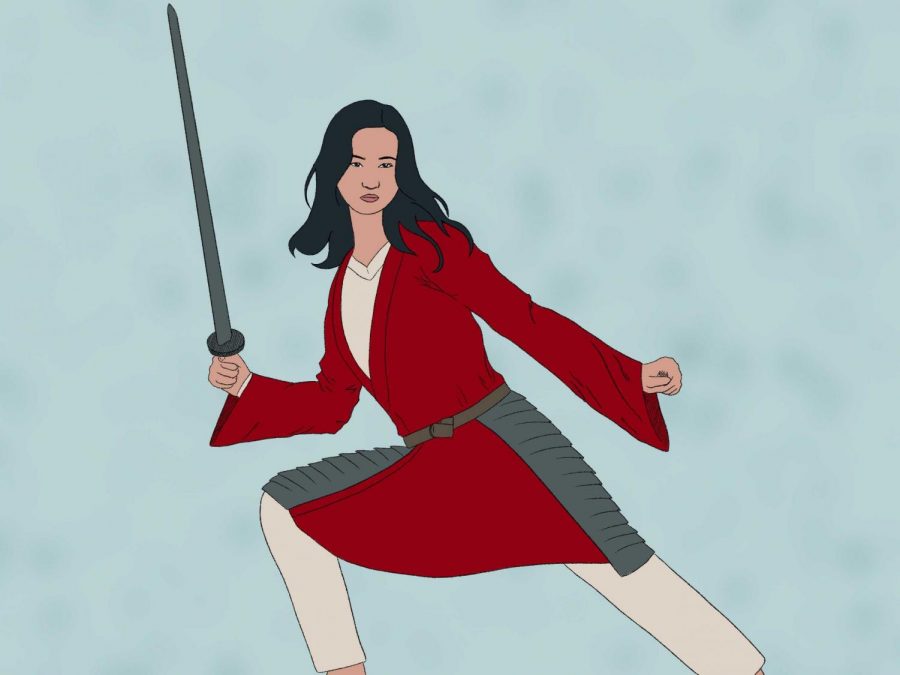With the 2020 release of Disney’s live-action “Mulan,” little is left desired in the way of grandeur.
The movie glistens with stunning costumes, breathtaking scenery and even beautiful, hyper-realistic animated birds. Every bit of excellence money can buy was fully present, and in some cases, executed with near perfection. What largely dimmed the lights on this otherwise sparkling movie was the only thing capital can’t touch — a sense of purpose.
“Mulan” struggles to find the same thing as its namesake protagonist. Both the character and the film are on a journey to find who they are in a crowded company. This is Disney’s fifth attempt at a live-action remake of original animation, and like the character, it sure does stand out, but not for the right reasons.
On a formal level alone, very few elements from the original animated movie remain. The premise is the same: a misfit young woman named Hua Mulan in Ancient China struggles to fit in and when her father is called to serve in the war, she pretends to be a man to serve in his place.
The remake claims, however, that it isn’t trying to stay loyal to the animation, but rather to the original ballad of Mulan (it appears in the credits as “suggested by the ballad of Mulan”). In many ways, it does subtly hark back to the animation — including references to original song melodies in its swelling (while still starkly European) score, composed by Harry Gregson-Williams.
The film also was shrouded in controversy from the moment of its conception to its release.
It faced its first round of controversy when details leaked that the movie would include a white male lead and a plot unlike either the ballad of Mulan or the original animation. After public outcry, the script was tossed and rewritten.
Disney created more public disgruntlement with the announcement that it would not be a musical, beloved travel-sized dragon Mushu wouldn’t be included and there would be no apparitions of ancestors.
Years later, in 2019, lead actress Liu Yifei made the retweet that sent Disney into chaos.
In the midst of the Hong Kong protests, Liu retweeted an image from a Chinese news outlet which read in Chinese, “I support Hong Kong. You can beat me up now,” followed by, “What a shame for Hong Kong” in English. #BoycottMulan was trending on Twitter when she made the tweet and again on its release date of September 4.
Actor Donnie Yen echoed her statement and both were noticeably absent from many of the film’s promotional interviews.
Like an avalanche, the controversies quickly kept piling.
After Liu’s statements came the revelation that the movie was filmed near areas where Uighur Muslims were being held in concentration camps in China (in the credits, the film even thanks a government entity which is listed in the U.S. as a group responsible for the atrocities).
Additionally, since Disney couldn’t hold its expected theatrical premiere in March due to the COVID-19 pandemic, the company announced it would be releasing the movie on its streaming platform Disney+ for a premium of a whopping $30 (in addition to the monthly subscription fee of $6.99).
Needless to say, its performance at the digital box office was underwhelming. The movie budget was $200 million, and it opened to $36.2 million in its first ten days. As of publication, Mulan has grossed roughly $64 million. For comparison, Disney’s live-action The Lion King had a budget of $250 million and grossed $1.65 billion by the time it left theaters.
That’s not to say the movie has no value in its artistry. The film is masterfully edited, with lots of exciting parallel cuts that bring the viewer along several journeys at once.
Director Niki Caro’s visual style is flexed in this film, and impressively so. While it’s not likely to be an Oscar contender, it is by and large the most cinematographically unique of Disney’s live-action remakes. Lots of Dutch angles and swinging cameras add to the action scenes and the mystery surrounding one particular character: the witch (more on her in a moment).
The bridal makeover montage is stunning. Inventive, colorful, beautifully balanced and composed shots inside a lively village make the introduction to the story an absolute joy to watch.
The choreography and martial arts sequences are stunningly crisp shows of strength and togetherness. The costumes are detailed and realistic from start to finish. The matchmaker, a cult favorite Disney character, is charming and humorous.
The script leaves much to be desired. The golden “show, don’t tell” rule is shattered almost immediately as Mulan’s parents speed through rushed exposition in the first ten minutes, spelling out for the audience cultural expectations and how they feel about them. Throughout the whole movie, no one is spared of the clumsy dialogue that tells the story at an awkward pace and denies characters their unique voice.
The titular character simply has no character. She is minimally acted by Liu and given almost no opportunity to display her inner thoughts or feelings, leaving the audience to seek a personal connection to the character rather than discover it.
Mulan’s relationships lack a particular charm that could have swayed many critical reviews in favor of the film.
Throughout the army’s training camp (which takes up a significant portion of screen time), Mulan (undercover as Hua Jun) does not attempt playing nice with the men. While this plays well for the lesson she has yet to learn about generosity and teamwork, once she does learn it, there is a short, half-hearted and stiff conversation around a bonfire that is supposed to suffice to replace a tangible camaraderie. There is little interaction shown between Mulan, her mother or her sister, and yet viewers are supposed to believe that they are a tight-knit family.
There is even a cringeworthy attempt at a romantic scene at the end, over a green-screen purple sky, where Liu emotionlessly simply acknowledges the presence of Chen Honghui (Yosan An). It’s short and unnecessary, leaving the relationship feeling forced, when before it simply was unimportant.
The relationship that works and is pulled off with excellence is the dynamic between Mulan and her father, Hua Zhou (Tzi Ma).
Ma, self-dubbed “Hollywood’s Go-To Asian Father,” narrates the story and gives a loving perspective, which affords both characters a sense of endearment from the audience. Zhou is the only character that gets more development than in the original animation.
He has depth, part in credit to Ma’s thoughtful performance, part in credit to the screenplay. He expresses regret, happiness, pride, care and shame in ways that the other characters don’t get the opportunity to. A lot of cultural themes are placed upon him to explain and represent and while that is arguably irresponsible writing, Ma handles most of them with grace.
Xianniang (played by Gong Li, referred to as “the witch”) is a shape-shifting witch who kills and takes on the bodies of her victims, an ally of the film antagonist, and a physical symbol of Mulan’s internal struggle.
No, you did not misread any words in that sentence. No, it wasn’t executed smoothly, either.
Her character had so much potential — a chance for audiences to see that Mulan is struggling with not only concealing her identity but scorn against the culture which confines her to a restrictive role just because of her gender — but instead, she is inexplicably knowledgeable of everything about Mulan and transforms into a flock of birds as her preferred mode of travel.
This is again supposed to be a reflection of Mulan’s phoenix (the symbol of her ancestors), which always guides her towards safety. But due to a shocking lack of context, this isn’t immediately apparent and still bears no meaning. She coaxes (or taunts, depending on who is viewing) Mulan by saying they are the same, just powerful misfit women who will never be understood.
But when Mulan is inexplicably and suddenly accepted by her peers after revealing that she is a woman, Xianniang says that they will never be the same since she will never be tolerated. She then leads Mulan to Bori Khan (excellently portrayed by Jason Scott Lee) and promptly sacrifices herself to prevent Mulan from attack.
To make matters all the more confusing, the witch betrays the film’s antagonist at the end, making a boldly feminist statement before leaving him. The only explicitly female-forward dialogue in the entire screenplay is delivered by a woman who is pitted against Mulan for the vast majority of her screen time — perhaps an unintentional pitch in the writer’s room or a shot-and-missed attempt at making a statement about feminism in Western society.
Mulan’s transformation moment is not only disappointing but thematically counterproductive. She removes her armor (is it more feminine to not wear protective gear to war?) and simply strides back into battle, letting her perfect curls (while it’s definitely genetically possible for East Asians to have wavy hair, it’s extremely uncommon) down over her face and shoulders — also seeming a little impractical given the battlefield situation.
If the movie’s messaging is that women are capable and should have the same opportunities as men, why is it that Mulan’s femininity is dependent on how she looks?
“Mulan” is a visual stunner. There’s no denying it’s beautiful to look at, it contains elements that are exciting and awe-inspiring. Tzi Ma and Jason Scott Lee give heartfelt, convincing performances that shine. Gregson-Williams’ score is, while nothing innovative, perfectly fitting. The movie sparkles to watch but dulls upon contact.
Cultural values were forced into easy-to-digest boxes and seemed lazily researched (is it worth noting all four screenwriters and the director are white?). Feminist messaging was contradicted and reinforced by all of the wrong characters. The conversations are cardboard, relationships are forced.
Overall, “Mulan” is not the stunningly progressive feminist Chinese representation that Disney thought it was, and it won’t be worth much cinematically in the long run. It’s worth the watch once it is freed from the premium, if you already subscribe to Disney+, but don’t expect anything more than a hasty rewrite with a big budget.













